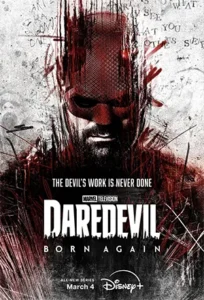
Vigilantism is central to Daredevil: Born Again, but what does our fascination with the antagonistic vigilante reveal about us?
 Daredevil: Born Again Matt Corman and Chris Ord Disney+ 4 March – 15 April 2025
Daredevil: Born Again Matt Corman and Chris Ord Disney+ 4 March – 15 April 2025
In its first season, Daredevil: Born Again (major spoilers included) reunites some characters and introduces others to the lawyer-by-day and vigilante-by-night Matt Murdock/Daredevil (Charlie Cox). Taking place about seven years after the events of Season 3 of the Netflix series Daredevil, the season follows Matt as he tries to adjust to a new status quo.
We’re not serving justice here, you know? We’re babysitting chaos. – Matt

The status quo by the end of the first episode (S1E1, “Heaven’s Half Hour”) sees him hanging up the Daredevil costume due to a personal tragedy, and Wilson Fisk/Kingpin (Vincent D’Onofrio) elected as Mayor of New York City. The last episode (S1E9, “Straight to Hell”) sees Fisk fully embracing his kingpin role and the violence it necessitates, restricting citizens’ freedoms through authoritarianism and martial law, and Daredevil working with Frank Castle/the Punisher (Jon Bernthal) and recruiting others to take back the city.
At its core, Daredevil: Born Again explores “the vigilante question” in myriad ways. Consistent with its predecessor, this question animates the tensions within Matt Murdock as he struggles with what it means to be on the side of justice, both as a defense lawyer and a vigilante. This is a struggle germane to both Daredevil narratives more broadly.
Unique to Daredevil: Born Again, however, is Fisk’s rise as a political figure and his motivation to outlaw and extinguish the need for vigilantes like Daredevil by ensuring law enforcement is sufficient for addressing crime. A second singular feature is the presence of a group of morally questionable cops who take a more violent (and rights-violating) approach to their jobs. Third, Matt interacts with multiple vigilantes throughout the series, which serve as reminders for why he donned the costume in Daredevil.
Lastly, Daredevil: Born Again is different to the Daredevil theme in that journalist interviews with residents are sprinkled throughout multiple episodes. This approach highlights the pervasiveness of vigilantism as a social fact and the varying perspectives concerning its effects on and role within society.
The Letter, the Spirit, and the Vigilante
While the vigilante question is central to the show, I’m interested in what the question and our fascination with it suggest about us. Daredevil: Born Again explores the dual importance of the vigilante in shaping our understanding of the distinction between what is legal and what is moral. It does this by alluding or pointing to specific boundary conditions that some philosophers and psychologists suggest we may employ when making this distinction. On the one hand, vigilantes signal these boundary conditions and remind us of their relevance for our social relations; on the other, their actions often put these criteria in tension in particular ways.
Legal scholar Stephanie Juliano defines a vigilante as someone who breaks the law in pursuit of personal justice, where “personal” pertains to the notion that achieving justice for oneself is also achieving justice for everyone. This pursuit is motivated by an imbalance between the legal system and the citizens it is supposed to serve, as in cases of corruption and when the letter of the law (e.g., its guidelines and procedures) overlooks the spirit of the law (e.g., holding wrongdoers accountable).
Juliano documents the long history of various vigilante iterations, dating back to the Middle Ages, while noting the multiple contemporary vigilantes. A variation of this type of justice characterizes Matt’s superhero mission. Instead of treating an injustice against himself as an injustice towards others, it is as if injustices against others, particularly those not adequately addressed by the law, are injustices toward himself.
Although not focused on the causes of vigilantism, many psychologists and philosophers appeal to this letter-spirit imbalance when contemplating what constitutes or should constitute our social existence. Similarly, philosopher Jennifer Wright believes a key function of moral principles within a group, community, or society is establishing limits on what norms should be adopted and how they should be adopted. The Social Cognitive Domain Theory’s approach to social and moral judgments brings these sentiments together by centering specific distinguishing criteria, our boundary conditions, as explored in Daredevil: Born Again. For brevity, I focus on two: rule or authority-contingency and generalizability.
Throughout the season, Matt’s increasing frustrations with the legal system and corresponding reliance on vigilantism to assuage these frustrations can be interpreted in light of these criteria. As a lawyer, Matt represents the authority of the government. So his decision to break the law in pursuit of justice takes on a different meaning than that of his superpowered contemporaries, as he knows all too well the promises of the well-functioning legal system as well as the perils of an ill-functioning one.
As philosophers have argued and psychological research indicates, people generally believe that moral principles, such as the prevention of harm and accountability for wrongdoing, are not contingent upon the existence of rules or the commands of authority. So when Matt goes against Mayor Fisk’s directives and breaks multiple laws in the process, he is expressing a sentiment shared by both vigilantes and everyday citizens.
Matt’s navigating between his work as a lawyer and vigilante also points to the generalizability criterion. As his references to his faith throughout the show suggest (S1E1, “Heaven’s Half Hour”; S1E6, “Excessive Force”), Matt believes that when one is sufficiently aware of and in a position to achieve justice for the vulnerable, one must do so. Thus, others similarly positioned should also be willing to break the law in the interest of justice. Though he initially refuses to use his extra-legal abilities to help those who ask, he eventually decides enough is enough and returns to vigilantism (S1E6, “Excessive Force”).
Similarly, everyday people tend to view adherence to the above moral principles as generalizable, as individuals should avoid harming, cheating, and stealing from others regardless of their position within a social hierarchy, geographical location, or institution (e.g., school versus home). Juliano’s analysis of historical and contemporary vigilantism suggests that vigilantes who risked their lives for the sake of justice are motivated by a similar belief.
The Vigilante Conundrum
Yet, Daredevil: Born Again can also make us uneasy. While Matt usually avoids lethal punishment, his brand of vigilantism is very violent. Despite the ubiquity of past and present vigilantism, most people within a community or society do not resort to such tactics. As Juliano points out, most contemporary vigilantism is non-violent.
Moreover, Douglas Fry, a professor of Peace and Conflict Studies, notes that cross-cultural evidence from anthropological studies suggests that while the principle of reciprocity appears to be universal, lethal revenge is not, and that for many societies, conflict resolution methods do not include physical aggression. Lastly, cross-cultural findings from both constructivist and intuitionist approaches to moral psychology suggest that the prevention of harmful social relations and the maintenance of just ones, at least in the abstract, appear to be human universals.
This non-violent and particularly non-lethal arc of human history also relates to the above distinguishing criteria. Specifically, Daredevil: Born Again, in addition to appealing to rule or authority-contingency and generalizability as justifications for Matt’s actions, highlights how these criteria, when in tension, can help explain the uneasiness we may feel (and the criticisms we may have) of those same actions. Although one way to view the generalizability criterion is as a way to motivate people to adhere to moral principles, Matt complicates this by being extremely unique.
Multiple studies suggest that everyday people view adherence to moral principles as generalizable, while adherence to rules and laws geared toward social regulation and order is perceived as context-dependent and consensus-based. However, while the everyday person can easily share Matt’s views on the insufficiency of the law (rule or authority-contingency), this is not the case with Matt’s actions to remedy this problem (generalizability).
We are not gifted with heightened senses enabling us to interact with people in fundamentally different ways (e.g., hearing others’ breathing, heartbeats, and private conversations, and “sensing” action scenes in slow motion). As a result, we are unable to prevent would-be victims from being harmed and perpetrators from escaping accountability in the manner and scale of a hyper-aware lawyer and vigilante in a superhero series. Abilities that, in the context of the letter-spirit distinction and its implications for pursuing “true” justice, allow Matt/Daredevil to see otherwise.
This tension, coupled with the human tendency to avoid physical violence — the existence of wars notwithstanding — partially explains the fascination with vigilantes and their relatively small share of the population. It also helps to partially explain our uneasiness with Matt’s methods despite our understanding of his motivations as a matter of principle.
When it comes to the historical and contemporary vigilantes that Juliano documents, this tension between the rule of authority contingency and generalizability criteria may be primarily due to our tendency to resolve conflict through non-violent means. For superpowered vigilantes like Daredevil, the tension stems from both our preference for non-violence and our inability to consistently inflict violence on a large scale while easily evading accountability in cases where we may, after witnessing or experiencing a gross injustice, at least consider the possibility of a violent response. These acts, while common, entertaining, and thought-provoking in the fictional world, are rare in the real world for very good reasons.
Justice and Its Vagaries
Philosopher Paul Ricoeur, speaking on justice, notes that while injustice is ubiquitous throughout society, whereas how to best address it is not. Or, put another way, it is easier to identify what is morally wrong in social relations than to ensure those relations are morally right.
Vigilantes exemplify this discrepancy, and one notable example is Daredevil: Born Again. Whether its appeal has more to do with our fascination with what justifies Matt’s mission, what complicates or criticizes it, or both, the show reminds us of the importance of the criteria we use to determine when a social interaction may be considered moral and when it may may be more about efficiency, social regulation, or social order.
As scholars attest, both are important for social relations, but they are not the same. To the extent that we prioritize the latter at the expense of the former, we risk not living up to the best of social ideals: ideals that preserve the welfare and just treatment of everyone.
Works Cited
Fry, Douglas P. “Reciprocity: The Foundation Stone of Morality”. Handbook of Moral Development, 1st Edition, edited by Melanie Killen and Judith G. Smetana. Routledge. 2006.
Graham, Jesse, Jonathan Haidt, Sena Koleva, Matt Motyl, Ravi Iyer, Sean P. Wojcik, and Peter H. Ditto. “Moral foundations theory: The pragmatic validity of moral pluralism”. Advances in Experimental Social Psychology. 2013.
Helwig, Charles C., Elliot Turiel, and Larry P. Nucci. “The Virtues and Vices of Moral Development Theorists”. Developmental Review, 1996.
Henderson, Stephen E. “Daredevil: Legal (and Moral) Vigilante”. Ohio State Journal of Criminal Law. 2017.
Juliano, Stephanie. “Superheroes, Bandits, and Cyber-Nerds: Exploring the History and Contemporary Development of the Vigilante”. Journal of International Commercial Law and Technology. 2012.
Peters, Timothy. D. “Daredevil as Legal Emblem”. Law, Technology and Humans. 2020.
Ricoeur, P. Oneself as Another. Chicago: University of Chicago Press. 1992.
Smetana, Judith G., and Yoo, Ha Na. “Development and Variations in Moral and Social-Conventional Judgments: A Social Domain Theory Approach”. In Handbook of Moral Development, 3rd Edition, edited by Melanie Killen and Judith G. Smetana. Routledge. 2023.
Turiel, E. Moral Judgments and Actions: Development and Processes of Coordination. In Handbook of Moral Development, 3rd Edition, edited by Melanie Killen and Judith G. Smetana. Routledge. 2023.
Wright, Jennifer C. Morality as a Regulator of Divergence: Protecting Against Deviance While Promoting Diversity. Social Cognition. 2021.


